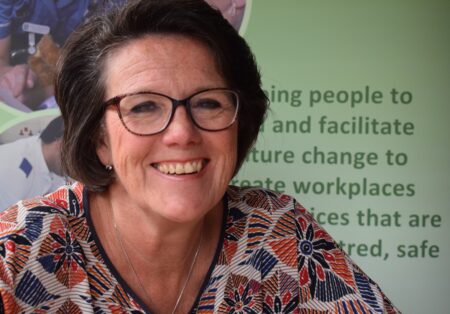Home News & Views Creating spaces for generative listening and generative conversation
Creating spaces for generative listening and generative conversation

Jo Odell, FoNS Practice Development Facilitator and Inspire Improvement Fellowship Lead
Some of the feedback I have received from the Inspire Improvement Fellows during the recent learning block (Sept-Oct) and at our alumni events is that the way we work at FoNS is ‘magic’ or is described as being ‘FoNSed’. However, far from magic, our development programmes are underpinned by principles which are drawn from transformational practice development (Manley et al., 2021), the Guiding Lights for effective workplace cultures (Cardiff et al., 2020) and person-centred ways of working (McCormack et al., 2021). As an organisation we have agreed the following guiding principles:
- Being person-centred by valuing and respecting the uniqueness, individuality, contribution and potential of all we work with
- Enabling collective leadership by working in ways that are inclusive, collaborative and participatory
- Working with individuals and teams to co-create shared values and goals that are realised in practice
- Creating learning environments that are safe, critical and creative
- Focussing on what matters to those we are working with
Recently I have discovered a new theory, one that I believe is strongly aligned to the way we work at FoNS. Theory U (Scharmer, 2018, p X) describes an awareness-based method for changing systems. It comprises three elements:
- A framework for seeing the blind spot of leadership and systems change
- A method for implementing awareness- based change: process, principles, practices
- A new narrative for evolutionary societal change: updating our mental and institutional operating systems (OS) in all of society’s sectors
I am particularly interested in the first element – the idea of ‘the blind spot’ and the consequences of not identifying this as individuals and leaders. Scharmer argues that as leaders we can raise our consciousness by suspending our habits and starting to open our mind, our heart and our will to enable us to become more present in our relationships at work.
But where do we start? Scharmer (2018, p 26) suggests that:
‘Changing how you listen means that you change how you experience relationships and the world. Change that and you will change everything!’
I believe that to start listening differently we need space to raise our consciousness about how we listen to others and to ourselves. Am I listening with an open mind, open heart and open will?
Scharmer (2018, p 28) suggests that there are three enemies to achieving this, the:
- Voice of judgement which can be overcome through curiosity: the opening of the mind
- Voice of cynicism which can be overcome through compassion: the opening of the heart
- Voice of fear which can be overcome through courage: the opening of the will
Further, Scharmer (2018, p 42) argues that whilst listening is the way people make sense of the world around them, the way we have conversations ‘creates the world’ we live in: relationships, groups, organisations and society. By applying deep listening over time, conversations will drop to a deeper level and better relationships will emerge. To help us understand/raise our consciousness about how to create better conversations, Scharmer describes four levels of conversations. These move from ‘politeness’ or habitual shared monologues, to controlled or skillfull discussions, followed by reflective dialogue and finally, generative dialogue. I encourage you, to reflect on the types of conversations you are having with colleagues, and to consider the level of conversation that you would like to move towards?
Now that I have discovered Theory U, I think this provides further insight into the FoNS ‘magic’. As I reflect upon FoNS’s guiding principles, I believe that person centredness, co-creation and collective leadership enable the development of safe psychological spaces, where people can feel heard and listen generatively to others in similar situations, to converse and to generate ideas to take back to work and try them out. I would welcome any thoughts or comments you have, as I further develop and work with these new insights as a facilitator.
References
Cardiff, S., Sanders, K., Webster, J. and Manley, K. (2020) Guiding lights for effective workplace cultures that are also good places to work. International Practice Development Journal. Vol. 10. No. 2. Article 2.
Scharmer, C.O. (2018) The Essentials of Theory U: Core Principles and Applications. Oakland, CA, USA: Berrett- Koehler Publishers.
Manley. K., Wilson. V., Oye. C. (Eds.) (2021) International Practice Development in Health and Social Care. 2nd Edition. Chichester, UK: Wiley Blackwell.
McCormack. B., McCance. T., Bulley. C., Brown. D., McMillan. A. and Martin. S. (2021) Fundamentals of Person-centred Healthcare Practice. Chichester, UK: Wiley Blackwell.
Comments are closed.

